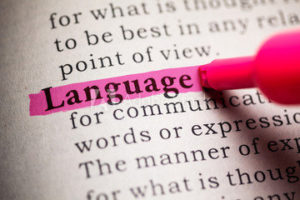I like to watch language change the way many people like to see the seasons change – in fact, I like them both. Language change is the more unpredictable, yet, like the eternal revolution of heat and cold, it is inevitable and inexorable.
English existed as a language as early as the 5th century AD, with the arrival (make that “invasion”) of three dialect groups from the German mainland. But it sounded thoroughly Germanic, with lots of suffixes we lack, no pronoun “she,” and minus all the thousands of French and Latin words that came in during the Middle Ages.
Over the centuries, there were, for numerous reasons, profound changes in syntax and pronunciation. I would say that the earliest English we could understand would come from the late 17th century, and even then there would be a lot of unfamiliar vocabulary. Just remember that when you see a film set in the Middle Ages (or, even worse, in the time of King Arthur, when nobody spoke English), and they‘re all talking with modern British accents. It’s a copout! In fact, the English of the 1200s would be so different from Modern English that we would need subtitles.
Recent changes in English
The dawn of my consciousness as a linguist establishes sort of a baseline; it’s when I really started paying attention. Back then, “February and “library” had two “r”’s each, there as only one “u” in “nu-CLEE-ar” (not “nu-cu-lar”).
“Go” was reserved for animal sounds (“Pigs go ‘oink’”). Now people can go, as in “He arrived at ten, and I go, ‘You’re late!’” Other verbs of speech reporting have appeared, noted below.
“Like,” formerly a preposition and clause introducer (the latter usage was controversial: does anyone remember “Winston tastes good like [it should be AS] a cigarette should”?), is now a verbal hiccup which enables the speaker to distance himself from his/her/statement, e.g., “Like, I couldn’t tell him that, like, I’m like so bored.” “Like” in this usage is a syllable of non-commitment. It is the near-ubiquitous “as-if” signal of people unwilling to stand behind what they say or perhaps unable to find a more accurate word.
“They” has taken over, at least in colloquial speech and writing, as a pronoun for an indefinite antecedent (“A doctor might use the new drug on their patient.”). I see it in print.
We’ve acquired new syntactic speech mannerisms, e.g., postposed NOT to convey irony, as in ”I’ll be there tomorrow – NOT”…or postposed interrogatives, e.g., ”And you would be…?” or “”So you are here because…” as if the speaker is saving the hearer the trouble of deciphering the inverted English question syntax (”Why are you here?”) and providing an easy, fill-in-the blank way to respond.
“Home in on” – what a missile or homing pigeon does – is being replaced, rather quickly, by “hone in on,” with its connotations of sharpness and focus. I see that one in print, too.
With all of this as background, I consider a linguistic item brought to my attention by Steve, the friend of a friend.
“So” — what???
He asks: “Is anyone else annoyed by all the people answering every question with the adverb ‘so’? Example question: ‘How deep is the ocean?’ Example answer: ‘So, it depends where you measure.’ Is this new verbal cliché confined to academics and political analysts on NPR (where I just heard it in virtually every answer on Science Friday) or has it infected young people everywhere? Seems to be joining, ‘I was like…,’ she was all…’ and other verbal sludge in our language. Harrumph!
“I’ve noticed it and wondered. It’s not the traditional connective you might have expected meaning “therefore, as a result of.” It’s more of an enclitic, like “well,” a pause, a way to regroup and go on with an answer. [Not quite: an enclitic is a reduced word at the end of a word, like the “r” at the end of “yes’r,” a contracted form of “yes sir.” – AMP]”
“Mistake” = change in progress?
As always, when we see a “mistake” or an innovation that pisses people off, it is evidence of change in the language system, and we gotta chill out and try to see what’s going on. Language is, in the title of John MacWhorter’s new book, always “on the move.”
People don’t know that until recently, “transpire” originally meant ‘to become known’ (trans + spire = “breathe across”), rather than ‘to happen.’ Happening vs. becoming known – important difference lost.
The verbal mannerism Steve notes is new to me but not unrelated to the other meanings of “so,” in this case continuative (“The store was closed, so we left.”). “So” apparently now means ‘thus, in order to continue the discussion.’ But it may mean nothing at all, beyond being a boundary marker, like sentence-initial “now” in many contexts (“Now, if we turn to the next topic…”). And of course, any innovation that spreads through a social group like NPR Nation can become definitive of group membership – “So, I’m so cool, I start sentences with ‘so.’”
One final example for Steve: In the last century, the progressive passive (“The house is being built”) was ridiculed as verbal sludge. But it moved in and is now fully accepted, even though we already had “the house is a-building.”
Of course Steve and I wouldn’t say “I’m all…” and “He goes…” — we’re over 15. We very consciously adopt age-appropriate expressions. But the word “cool,” in an area of language that changes very rapidly – terms of (dis)approbation – seems eternal and sounds fine, no matter who says it. And that’s cool.
Permanent link to this post (955 words, estimated 3:49 mins reading time)












